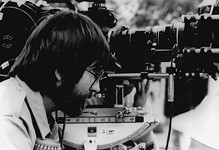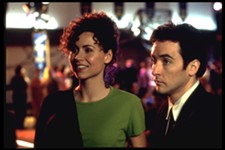Sister My Sister
1995 Directed by Nancy Meckler. Starring Julie Walters, Joely Richardson, Jodhi May, Sophie Thursfield.
REVIEWED By Alison Macor, Fri., Sept. 29, 1995
While driving out of the parking lot after seeing Nancy Meckler's provocatively disturbing debut film Sister My Sister, I noticed the bumper sticker on the car in front of me: Sisterhood Is Powerful. Normally not moved by sentiments expressed on car bumpers, I found the coincidence eerily appropriate. Based on actual events that occurred in Le Mans, France in the early 1930s, Meckler's film is a retelling of the murder committed by two sisters against their employer, an upper-middle class woman, Madame Danzard (Walters), and her daughter Isabelle (Thursfield). Revealing this key plot point will not ruin the film because its impact comes through the telling, not solely in the tale itself. In fact, the murder is revealed in the film's first 10 minutes. An initial scene introduces the sisters as young girls playing together and establishes Christine's (Richardson) position as caretaker of her younger, weaker sister Lea (May). Immediately following this gentle tableau is a scene depicting the Danzards' home in the aftermath of their grisly attack. Sister My Sister is not the first recounting of this grisly murder; the event has provided rich source material for other artists to mine over the years, most notably Jean Genet in his play, The Maids. Additionally, Meckler directed the London play on which this film is based, and playwright Wendy Kesselman adapted her story for the film. Kesselman's script makes good use of the inherent doubling in the story: the two sisters, the mother and daughter whose relationship mirrors that of their maids, and the parallel ideas expressed by older sister Christine and Madame Danzard about class and social behavior. This carefully constructed framework provides a very formal structure to the film, one that lends even more impact to its violent, uncontrolled climax but also succeeds in distancing the viewer somewhat. The distance generated by the film's narrative structure is a double-edged sword: It gives the story a sharp tension but also a somewhat sterile tone despite richly detailed sets and warmly lit scenes exquisitely photographed by Ashley Rowe. Perhaps Meckler intended this effect, underscored as it is by the judge's unemotional reading of each sister's sentence. A similarly relevant issue in Sister My Sister is the depiction of the sexual relationship between Christine and Lea. While I don't doubt that Meckler intended the film as a commentary on the taboos of 1930s France specifically and of the oppressiveness of religion and society in general, the film suggests a link between the sisters' lesbian relationship and their later pathological behavior that is quite disturbing. Because of these ambiguities, Sister My Sister invites a first viewing and perhaps even a second.
A note to readers: Bold and uncensored, The Austin Chronicle has been Austin’s independent news source for over 40 years, expressing the community’s political and environmental concerns and supporting its active cultural scene. Now more than ever, we need your support to continue supplying Austin with independent, free press. If real news is important to you, please consider making a donation of $5, $10 or whatever you can afford, to help keep our journalism on stands.
Feb. 14, 2025
Steve Davis, July 12, 2019
Feb. 26, 2010
April 11, 1997
Sister My Sister, Nancy Meckler, Julie Walters, Joely Richardson, Jodhi May, Sophie Thursfield









